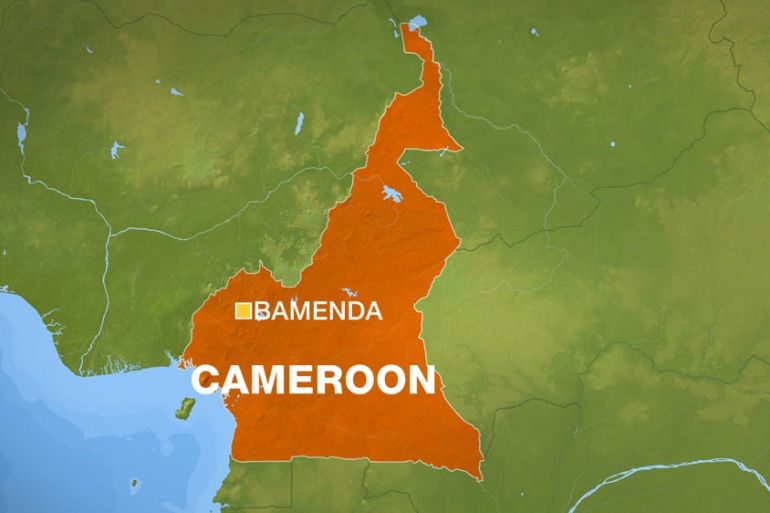Dozens of students abducted in Cameroon by alleged separatists
Officials say armed separatists have kidnapped at least 78 students in the country’s restive northwest region.

Armed separatists have kidnapped nearly 80 people, the majority of them students, in an English-speaking region of Cameroon witnessing an armed campaign for independence, a governor has said.
Governor Deben Tchoffo said students from a Presbyterian school, located in Nkwen village near Bamenda in the restive northwest region, were abducted on Monday along with their principal, a teacher and a driver.
Bamenda is the capital of Cameroon’s northwest region, which is facing attacks by Anglophone separatists.
Video released
A video purportedly of the kidnapped children was released on social media by “Amba boys”, a reference to the state of Ambazonia that armed separatists are trying to establish in Cameroon’s northwest and southwest regions, The Associated Press news agency reported.
In the video, the kidnappers force several students to give their names and the names of their parents. The children say they were kidnapped by the Amba boys, and they do not know where they are being held.
“We shall only release you after the struggle. You will be going to school now here,” say the men suspected to be the kidnappers.
While the video could not be independently verified, The Associated Press said parents have been reacting on social media saying they recognize their children in the video.
These are studends from Presbyterian Secondary School of Nkwen , Mezam division , Bamenda
They have been kidnapped by amba boys yesterday nigth in their boarding school @USEmbYaounde @amnesty @hrw @UNESCO @UNICEF @RFI_English @BBCBreaking @UNHumanRights pic.twitter.com/aktsBC1Oxv— cameroon- truth (@CameroonTruth) November 5, 2018
“The search for the hostages has been launched, every man has been called in,” a government source said after he emerged from a crisis meeting.
The kidnapping – the gravest incident so far in 13 months of unrest – coincides with a surge of political tensions in the majority French-speaking country.
It comes after elections on October 7 that saw President Paul Biya, 85, secure a seventh term in office. He is expected to take his oath of office on Tuesday.
![President Paul Biya, who has led since 1982, easily won a seventh term last month [File: Sunday Alamba/AP]](/wp-content/uploads/2018/11/ec49ad4313f542628502c440251a4a70_18.jpeg)
Divided country
Around a fifth of Cameroon’s 22 million people speak English, a minority whose presence dates back to the colonial period.
Cameroon, once a German colony, was divided between Britain and France after World War I. The French colony gained independence in 1960 and became Cameroon.
The following year, British-ruled Southern Cameroon was amalgamated into it, giving rise to tension in the northwest and southwest regions.
In 2016, demands for greater autonomy grew but met a rebuff by Biya. Last year, the Anglophone movement declared the “Republic of Ambazonia” in the northwest and neighbouring southwest regions.
No country has recognised the self-declared state.
The separatists have shot troops and police, boycotted and torched schools, and attacked other perceived symbols of the Cameroonian state.
At least 400 civilians were killed this year, apart from over 175 members of the security forces, according to a toll compiled by non-governmental organisations.